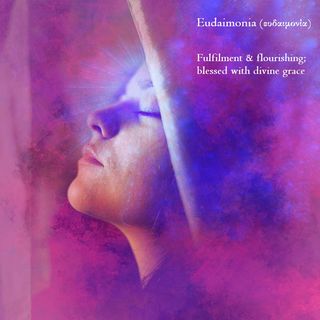Happiness
Greek Philosophy and the Key to Happiness
Finding fulfilment through eudaimonia.
Posted March 20, 2018

This week its been great to see the passion and enthusiasm surrounding the annual International Day of Happiness. And amidst all the sharing and discussions, people may have encountered an unfamiliar Greek term which keeps cropping up: eudaimonia. In fact, this word is central to fields such as positive psychology, where it is frequently celebrated as one of two main types of happiness, alongside the hedonic variety. Hedonic happiness—also known as ‘subjective wellbeing’1—pertains to positive affect and appraisals of life satisfaction. Basically, pleasure and enjoyment. Which is all very well. But is that all there is to happiness? The answer, I’m sure most people would agree, is no.
Finding fulfilment
There are myriad feelings, qualities, and processes which matter deeply to us and are fundamental to our wellbeing, but which could not be regarded as pleasurable per se (even if they do sometimes feel good). Things like self-acceptance, autonomy, meaning in life, personal development, relationships, and mastery of one’s environment. In contrast to hedonic well-being, these items are all regarded as constituents of eudaimonic happiness (also known as ‘psychological well-being’2). But where does the term come from?
Well, it dates back—as do so many contemporary academic terms, including psychology itself—to the intellectual furnace of classical Greece. Indeed, so too does the very distinction between hedonism and eudaimonia. For there we see philosophers like Aristotle taking a relatively dim view of the former. He disparagingly regarded most people as ‘slavish in their tastes’, living a ‘life suitable to beasts’, i.e., driven by carnal instincts and urges3. By contrast, he felt that a life devoted to truth and beauty was qualitatively deeper and more worthwhile. And, he characterized such a life as one of eudaimonia.
Cultivating virtue
The word itself has an interesting etymology. It originally described the enviable state of being infused with a benevolent (eu) spirit (daimon). In classical Greece —and indeed across the world at that time—wellbeing was regarded as mostly outside one’s control4. With science and medicine in their infancy, the issue of who fared well or poorly seemed essentially a matter of fate. And, in that mythologically-infused era, this fate was usually interpreted as being under the sway of the gods. The person who prospered was, therefore, one favored by these divine powers, while the one who suffered had somehow incurred their disfavor.
However, the likes of Plato and Aristotle began to challenge this interpretation. They argued that people could influence their health and happiness, at least within certain limits. And the way they could was through self-cultivation. As Aristotle put it, eudaimonia constitutes the "activity of the soul in accordance with virtue"5. In this way, eudaimonia came to represent "higher" forms of happiness, ones only attainable by living a virtuous life. To an extent, this evaluative stance persists to this day, with many scholars championing eudaimonia over more hedonistic pursuits (even if some question the merit of treating these as separate forms of well-being, since many cherished experiences are a potent compound of both6.)
Embracing eudaimonia
As such, eudaimonia is a great example of psychology embracing an "untranslatable" word. Such words—which lack an exact equivalent in our own language—are valuable, not least because they highlight phenomena which have been overlooked or underappreciated in one’s own culture. For that reason, I am building a positive lexicography of such terms—specifically ones pertaining to wellbeing, given my affiliation to positive psychology—as I explore in two new books (please see bio for details).
Part of the rationale for this project is that the field of psychology—and English-speaking cultures more broadly—would benefit from a thoroughgoing engagement with untranslatable words, which have the power to greatly enrich its nomological network. Indeed, it already has benefitted from an ad-hoc importation of such words.
In addition to eudaimonia, Greek alone has furnished us with numerous such items, many of which have been fully assimilated into English. These range from psychology itself, as alluded to above, to a wealth of terms pertaining to positive effect, such as ecstasy, euphoria, and enthusiasm. Meanwhile, from Latin, we have terms such as ego and id, as per Freudian theory, while from German we get items like Gestalt and Ganzheit.
And so on, and on. These concepts have greatly enriched the field. How much more might we yet benefit from similarly untranslatable words which have yet to be embraced?
References
[1] Diener, E. (2000). Subjective well-being: The science of happiness and a proposal for a national index. American Psychologist, 55(1), 34-43. doi: 10.1037/0003-066X.55.1.3
[2] Ryff, C. D. (1989). Happiness is everything, or is it? Explorations on the meaning of psychological well-being. Journal of Personality and Social Psychology, 57(6), 1069-1081
[3] Aristotle, Nicomachean Ethics, ed. R. Crisp (Cambridge: Cambridge University Press, 350 bce/2000), at 6.
[4] D.M. McMahon. Happiness: A history. (New York, NY: Atlantic Monthly Press, 2006).
[5] Aristotle. Nicomachean Ethics. Edited by R. Crisp. (Cambridge: Cambridge University Press, 350BCE/2000), 11.
[6] T.B. Kashdan, R. Biswas-Diener and L.A. King, ‘Reconsidering happiness: the cost of distinguishing between hedonics and eudaimonia’. Journal of Positive Psychology 3, no. 4 (2008): 219–233.


